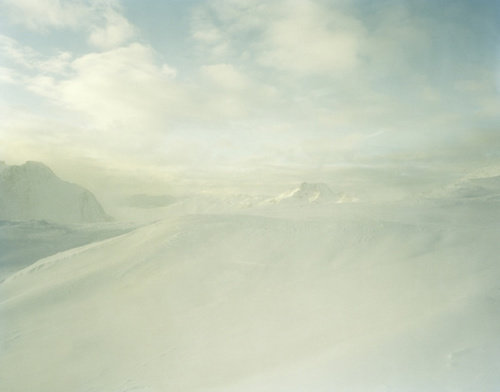Michael Schnabel
dal 18/9/2006 al 21/10/2006
Segnalato da
18/9/2006
Michael Schnabel
Galleria Foto-Forum (vecchia sede), Bolzano
With the suggestive power of forerunner Caspar David Friedrich the commemorative body of work "Stille Berge" - comprised of 35 nightscapes shot in the Alps - breaks the iconographic tradition of the romantic in a contemporary exceptionally bold photographic approach.

Stille Berge
Mountains are exalted geologic and geographic structures. They raise themselves from
their surroundings thereby obstructing views and routes of transportation. That is
their nature. They challenge us to move in a different manner as the horizontal
passage over the earth transforms into a vertical ascent. Reaching the peak requires
a laborious climb. For many, mountains have a limiting dimension. Others see the
tremendous mass as a form of liberation and flee to the endless panorama. Mountains
are not to be overlooked and impress us with their permanence. This factor is
responsible for the invention of the panorama as we know it. The history of the
mountains is a history of vertical conquest.
Michael Schnabel, a photographer from Stuttgart, has dedicated an extensive body of
work to the mystery of the mountains. With the suggestive power of forerunner Caspar
David Friedrich the commemorative body of work "Stille Berge" - comprised of 35
nightscapes shot in the Alps - breaks the iconographic tradition of the romantic in
a contemporary exceptionally bold photographic approach. Spanning over a number of
years he exposed mountains in the night, on starless cloudy nights absent of
moonlight, to capture the silent giants in a vague hardly recognizable gravitational
massiveness. Something is happening in Michael Schnabel's works. The mountains which
stand so solitary and clean overcome the viewer in the form of an utter silence that
is nearly physical. The images which at first look appear monochromatic in black
reveal in reality the nuances of countless colors imbued with the aura of the
inapproachable.
Schnabel's "Stille Berge" are elusive. There are colors in the works which divulge
in a moment the delicate structures and marvelous details in unseen beauty. After
the romantic landscape (similar to Caspar David Friedrich) and Buddhist humanism
(similar to Hiroshi Sugimoto) Schnabel shows his works worthy of the concept of
systematic deconstruction. Michael Schnabel, born in 1966, studied in Darmstadt and
San Francisco and lives in Stuttgart. His images can be accessed through the gallery
Photonet in Wiesbaden. His conceptually formulated debut has received numerous
prizes, publications and has been exhibited around the world. "Stille Berge" is
diminishing darkness in its most beautiful form.
Galleria Foto-Forum
via Weggenstein, 2/1 - Bolzano



